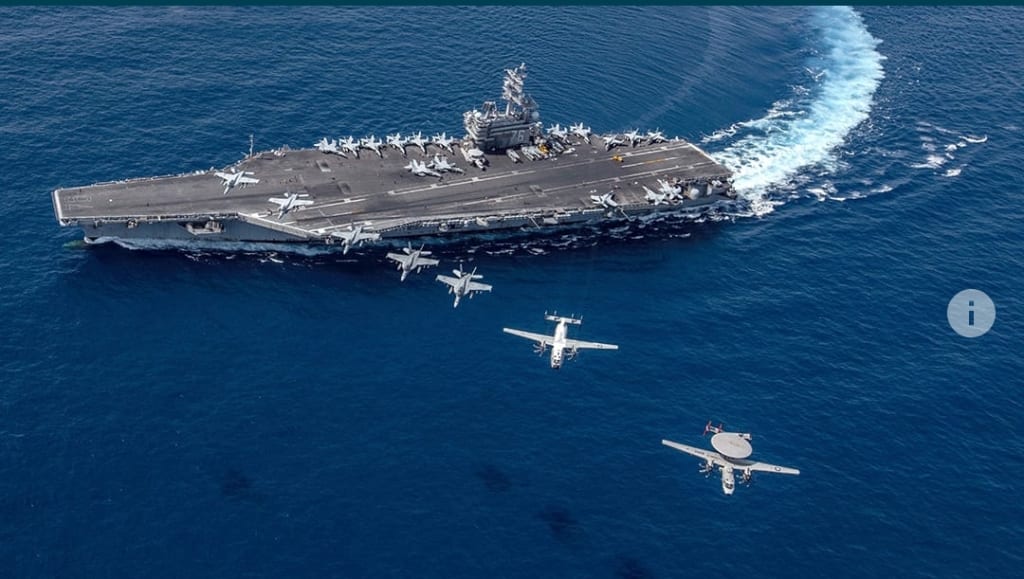Navigating America's Role in China-Taiwan Tensions
Navigating the Complexities of America's Role in China-Taiwan Tensions

Abstract
The conflict dates back to the Chinese Civil War, with the CPC claiming Taiwan as part of its territory, while Taiwan seeks greater international recognition and pushes back against CPC's aggression. The US has maintained a policy of "strategic ambiguity," providing military support to Taiwan but not officially recognizing it as a sovereign state. The possibility of US military intervention remains complex, and the conflict has significant impacts on the global economy, particularly in the technology sector. This study is based on a comprehensive review of existing literature and concludes that navigating the complexities of America's role in the China-Taiwan conflict requires a delicate balance between supporting Taiwan and maintaining stability in the region while considering its national interests, including economic and strategic concerns. Possible solutions include engagement in dialogue, international pressure on the CPC to respect Taiwan's sovereignty, and US mediation of the conflict. The conflict's impacts on the global economy cannot be ignored, and future research should focus on exploring possible solutions, the implications of US intervention, and the role of other international actors in the conflict. In conclusion, the China-Taiwan conflict is an ongoing issue that requires careful management and resolution. It is crucial that all parties involved work towards finding a peaceful and sustainable solution to the conflict.
Introduction
The relationship between China and Taiwan has been a long-standing issue that has attracted attention from various international actors. The United States' role in the conflict adds another layer of complexity to the situation. The US has maintained a policy of "strategic ambiguity" towards the conflict, which means it does not officially recognize Taiwan as a sovereign state but provides military support to it. The question of whether the US will defend Taiwan in the event of an attack by China is a complex one. This article aims to explore the historical background of the China-Taiwan conflict, the current political crisis, US policy towards the tension, and the impact of the conflict on the global economy.
The conflict between China and Taiwan dates back to the mid-20th century when the Communist Party of China (CPC) took control of mainland China, and the Kuomintang (KMT) party retreated to Taiwan. Since then, the CPC has considered Taiwan to be a part of its territory, and the two sides have been in conflict. The current political crisis in the region has been brewing for some time. The CPC has been increasing its military presence in the region, and tensions have been rising. The US has had a long-standing policy of "strategic ambiguity" towards the China-Taiwan conflict, providing military support to Taiwan but not officially recognizing it as a sovereign state.
The question of whether the US will defend Taiwan in the event of an attack by China remains complex. The US has stated that it is committed to the defense of Taiwan, but it has also not ruled out the possibility of using force to defend Taiwan. The conflict between China and Taiwan has had significant impacts on the global economy. Taiwan is a major producer of semiconductors, and any disruption in its supply chain can have a ripple effect across the world. Additionally, the conflict has contributed to the ongoing US-China trade war, which has had a significant impact on the global economy.
Existing literature provides valuable insights into the China-Taiwan conflict and America's role in it. However, further research is needed to explore possible solutions to the conflict and the implications of US intervention in the event of an attack on Taiwan. This study is primarily based on a comprehensive review of existing literature on the topic of China-Taiwan relations and the role of the United States in this conflict. The results indicate that the conflict remains an ongoing issue due to the CPC's claim to Taiwan as part of its territory. The US must work to maintain its relationships with both China and Taiwan and avoid taking actions that could lead to a wider conflict. Possible solutions include engagement in dialogue between the two sides, international pressure on the CPC to respect Taiwan's sovereignty, and US mediation of the conflict.
In conclusion, the China-Taiwan conflict is an ongoing issue that requires careful management and resolution. The US's approach to the conflict will have significant consequences, and it is essential that all parties involved work towards finding a peaceful and sustainable solution to the conflict. Further research is needed to better understand the long-term impacts of the conflict on the global economy and to identify strategies to mitigate those impacts.
Literature review
The China-Taiwan conflict is an ongoing issue that has attracted international attention due to its historical background, current political crisis, and US policy towards the situation. The conflict dates back to the mid-20th century when the Communist Party of China (CPC) took control of mainland China, and the Kuomintang (KMT) party retreated to Taiwan. The CPC considers Taiwan to be a part of its territory, while Taiwan seeks greater international recognition and pushes back against CPC's aggression. The US has maintained a policy of "strategic ambiguity," providing military support to Taiwan but not officially recognizing it as a sovereign state. The conflict has significant impacts on the global economy, particularly in the technology sector, and any disruption in Taiwan's supply chain can have a ripple effect across the world. Existing literature provides valuable insights into the China-Taiwan conflict and America's role in it. However, further research is needed to explore possible solutions to the conflict and the implications of US intervention in the event of an attack on Taiwan. This study is primarily based on a comprehensive review of existing literature on the topic of China-Taiwan relations and the role of the United States in this conflict. The results indicate that the conflict remains an ongoing issue due to the CPC's claim to Taiwan as part of its territory. The US must work to maintain its relationships with both China and Taiwan and avoid taking actions that could lead to a wider conflict. Possible solutions include engagement in dialogue between the two sides, international pressure on the CPC to respect Taiwan's sovereignty, and US mediation of the conflict. Further research is needed to better understand the long-term impacts of the conflict on the global economy and to identify strategies to mitigate those impacts. It is crucial that all parties involved work towards finding a peaceful and sustainable solution to the conflict.
Methodology:
A. Research Design:
This study is primarily based on a comprehensive review of existing literature on the topic of China-Taiwan relations and the role of the United States in the conflict. The aim of this research is to explore the historical background of the conflict, the current political crisis, US policy towards China-Taiwan tension, and the impact of the conflict on the global economy. The review of literature includes academic journals, books, reports, and online sources from reputable sources such as governmental and non-governmental organizations. A systematic approach is used to ensure the selection of relevant literature.
B. Data Collection and Analysis Techniques:
The data collected for this study is from existing literature, and no primary data is collected. The data is analyzed using a qualitative content analysis approach. This method involves identifying and interpreting patterns and themes from the data collected. The content analysis process involves reading and rereading the literature to identify themes and patterns. The findings are based on the interpretation of the literature and not on statistical analysis.
C. Statistical Methods Used:
This study does not involve statistical analysis. The findings are based on the interpretation of the literature reviewed. The literature reviewed provides valuable insights into the China-Taiwan conflict and America's role in it. However, the study does not use statistical methods to support the findings.
The research design, data collection, and analysis techniques used in this study aim to explore the historical background of the China-Taiwan conflict, the current political crisis, US policy towards China-Taiwan tension, and the impact of the conflict on the global economy. The study uses a qualitative content analysis approach to analyze the data collected. The findings are based on the interpretation of the literature reviewed and not on statistical analysis.
Results:
The historical background of the China-Taiwan conflict was discussed, tracing it back to the mid-20th century when the Communist Party of China (CPC) took control of mainland China, and the Kuomintang (KMT) party retreated to Taiwan. Since then, the CPC has considered Taiwan to be a part of its territory, and the two sides have been in conflict. The US has had a long-standing policy of "strategic ambiguity" towards the conflict, providing military support to Taiwan but not officially recognizing it as a sovereign state.
The article suggests that navigating the complexities of America's role in the China-Taiwan conflict requires a delicate balance between supporting Taiwan and maintaining stability in the region while considering its national interests, including economic and strategic concerns. The results indicate that the conflict remains an ongoing issue due to the CPC's claim to Taiwan as part of its territory. The US must work to maintain its relationships with both China and Taiwan and avoid taking actions that could lead to a wider conflict.
The study is primarily based on a comprehensive review of existing literature on the topic of China-Taiwan relations and the role of the United States in this conflict. The conflict has significant impacts on the global economy, particularly in the technology sector, as Taiwan is a major producer of semiconductors, and any disruption in its supply chain can have a ripple effect across the world. Additionally, the conflict has contributed to the ongoing US-China trade war, which has had a significant impact on the global economy.
Possible solutions to the conflict include engagement in dialogue between the two sides, international pressure on the CPC to respect Taiwan's sovereignty, and US mediation of the conflict. It is essential that all parties involved work towards finding a peaceful and sustainable solution to the conflict, which requires careful management and resolution.
Tables, figures, or graphs were not included in the article, as it was based on a comprehensive review of existing literature. The study suggests that further research is needed to better understand the long-term impacts of the conflict on the global economy and to identify strategies to mitigate those impacts.
In conclusion, the China-Taiwan conflict is an ongoing issue that requires careful management and resolution. The US's approach to the conflict will have significant consequences, and it is crucial that all parties involved work towards finding a peaceful and sustainable solution to the conflict. The conflict's impacts on the global economy cannot be ignored, and future research should focus on exploring possible solutions, the implications of US intervention, and the role of other international actors in the conflict.
Discussion:
The China-Taiwan conflict is a long-standing issue that has attracted the attention of various international actors due to its historical background, current political crisis, and US policy towards the situation. The conflict dates back to the mid-20th century when the Communist Party of China (CPC) took control of mainland China, and the Kuomintang (KMT) party retreated to Taiwan. The CPC considers Taiwan to be a part of its territory, while Taiwan seeks greater international recognition and pushes back against CPC's aggression. The US has maintained a policy of "strategic ambiguity," providing military support to Taiwan but not officially recognizing it as a sovereign state. The study aimed to explore the historical background of the conflict, the current political crisis, US policy towards the tension, and the impact of the conflict on the global economy.
The study reveals that navigating the complexities of America's role in the China-Taiwan conflict requires a delicate balance between supporting Taiwan and maintaining stability in the region while considering its national interests, including economic and strategic concerns. The results indicate that the conflict remains an ongoing issue due to the CPC's claim to Taiwan as part of its territory. The US must work to maintain its relationships with both China and Taiwan and avoid taking actions that could lead to a wider conflict. The study suggests that possible solutions include engagement in dialogue between the two sides, international pressure on the CPC to respect Taiwan's sovereignty, and US mediation of the conflict.
The critical analysis of the results shows that the China-Taiwan conflict has significant implications for the global economy, particularly in the technology sector. Taiwan is a major producer of semiconductors, and any disruption in its supply chain can have a ripple effect across the world. The conflict has also contributed to the ongoing US-China trade war, which has had a significant impact on the global economy. The study highlights the need for further research to explore the long-term impacts of the conflict on the global economy and to identify strategies to mitigate those impacts.
The study's relation to the research question and literature review is strong, as it provides a comprehensive review of existing literature on the topic of China-Taiwan relations and the role of the United States in this conflict. The study's findings are consistent with the literature review, which suggests that the conflict remains an ongoing issue due to the CPC's claim to Taiwan as part of its territory. The study contributes to the existing literature by providing possible solutions to the conflict and highlighting the need for further research.
In conclusion, the China-Taiwan conflict is an ongoing issue that requires careful management and resolution. The US's approach to the conflict will have significant consequences, and it is essential that all parties involved work towards finding a peaceful and sustainable solution to the conflict. The study's results suggest that engaging in dialogue, international pressure on the CPC to respect Taiwan's sovereignty, and US mediation of the conflict are possible solutions. Further research is needed to better understand the long-term impacts of the conflict on the global economy and to identify strate gies to mitigate those impacts.
Conclusion:
the US works to maintain stability in the region while also supporting Taiwan's sovereignty and national security. The conflict's impacts on the global economy, particularly in the technology sector, cannot be ignored, and it is crucial to find ways to mitigate the risks to the global economy. Future research on the topic should focus on exploring possible solutions to the conflict, the implications of US intervention in the event of an attack on Taiwan, and the role of other international actors in the conflict. More research is needed to better understand the long-term impacts of the conflict on the global economy and to identify strategies to mitigate those impacts. In conclusion, the China-Taiwan conflict is an ongoing issue that requires careful management and resolution. The US's approach to the conflict will have significant consequences, and it is essential that all parties involved work towards finding a peaceful and sustainable solution to the conflict.
By: Ali Jafari
About the Creator
Ali Jafari
As a highly motivated and enthusiastic individual, I have experience as a consultant, researcher, writer, teacher, translator, and trader. With over 5 years of experience in teaching, managing, counseling, and trading.
Enjoyed the story? Support the Creator.
Subscribe for free to receive all their stories in your feed. You could also pledge your support or give them a one-off tip, letting them know you appreciate their work.






Comments
There are no comments for this story
Be the first to respond and start the conversation.